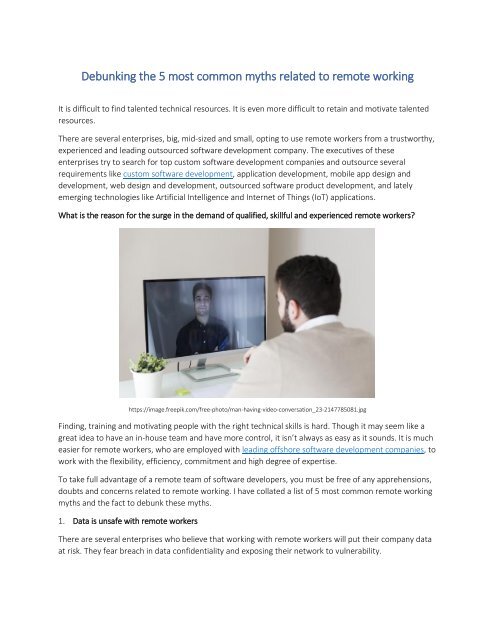Debunking the 5 most common myths related to remote working
Remote work is on the rise. From an employee perspective, the benefits of avoiding a commute are obvious, but employers also see benefits: Overhead costs go down if you don't have to provide desk space and equipment for your staff, and you'll never have to worry about lateness due to traffic or transportation issues. But if virtual employees aren't visible in the office, how can they remain accountable? It’s time to put stereotypes to rest. For the naysayers of remote work, here are 5 debunked myths about this growing sector.
Remote work is on the rise. From an employee perspective, the benefits of avoiding a commute are obvious, but employers also see benefits: Overhead costs go down if you don't have to provide desk space and equipment for your staff, and you'll never have to worry about lateness due to traffic or transportation issues. But if virtual employees aren't visible in the office, how can they remain accountable? It’s time to put stereotypes to rest. For the naysayers of remote work, here are 5 debunked myths about this growing sector.
- No tags were found...
Create successful ePaper yourself
Turn your PDF publications into a flip-book with our unique Google optimized e-Paper software.
<strong>Debunking</strong> <strong>the</strong> 5 <strong>most</strong> <strong>common</strong> <strong>myths</strong> <strong>related</strong> <strong>to</strong> <strong>remote</strong> <strong>working</strong><br />
It is difficult <strong>to</strong> find talented technical resources. It is even more difficult <strong>to</strong> retain and motivate talented<br />
resources.<br />
There are several enterprises, big, mid-sized and small, opting <strong>to</strong> use <strong>remote</strong> workers from a trustworthy,<br />
experienced and leading outsourced software development company. The executives of <strong>the</strong>se<br />
enterprises try <strong>to</strong> search for <strong>to</strong>p cus<strong>to</strong>m software development companies and outsource several<br />
requirements like cus<strong>to</strong>m software development, application development, mobile app design and<br />
development, web design and development, outsourced software product development, and lately<br />
emerging technologies like Artificial Intelligence and Internet of Things (IoT) applications.<br />
What is <strong>the</strong> reason for <strong>the</strong> surge in <strong>the</strong> demand of qualified, skillful and experienced <strong>remote</strong> workers?<br />
https://image.freepik.com/free-pho<strong>to</strong>/man-having-video-conversation_23-2147785081.jpg<br />
Finding, training and motivating people with <strong>the</strong> right technical skills is hard. Though it may seem like a<br />
great idea <strong>to</strong> have an in-house team and have more control, it isn’t always as easy as it sounds. It is much<br />
easier for <strong>remote</strong> workers, who are employed with leading offshore software development companies, <strong>to</strong><br />
work with <strong>the</strong> flexibility, efficiency, commitment and high degree of expertise.<br />
To take full advantage of a <strong>remote</strong> team of software developers, you must be free of any apprehensions,<br />
doubts and concerns <strong>related</strong> <strong>to</strong> <strong>remote</strong> <strong>working</strong>. I have collated a list of 5 <strong>most</strong> <strong>common</strong> <strong>remote</strong> <strong>working</strong><br />
<strong>myths</strong> and <strong>the</strong> fact <strong>to</strong> debunk <strong>the</strong>se <strong>myths</strong>.<br />
1. Data is unsafe with <strong>remote</strong> workers<br />
There are several enterprises who believe that <strong>working</strong> with <strong>remote</strong> workers will put <strong>the</strong>ir company data<br />
at risk. They fear breach in data confidentiality and exposing <strong>the</strong>ir network <strong>to</strong> vulnerability.
If you work with established offshore software development company, you don’t have <strong>to</strong> worry about<br />
data security. They have sophisticated IT systems, robust infrastructure, vetted software programs and<br />
security practices that are impossible <strong>to</strong> penetrate.<br />
2. Meetings are ineffective<br />
With a host of communication applications (Skype and Slack) available, online meetings can be quite<br />
effective. The frequency, duration and agenda of <strong>the</strong> meeting must be pre-decided so that <strong>the</strong> meetings<br />
can be effective. The time of <strong>the</strong> meeting can be mutually convenient for <strong>the</strong> <strong>remote</strong> team and <strong>the</strong><br />
enterprise using offshore software development services.<br />
3. Remote workers are not able <strong>to</strong> deliver on time<br />
The <strong>remote</strong> workers’ status shows as ‘away’ on messenger and <strong>the</strong> person is probably on a picnic or<br />
perhaps out shopping.<br />
You may have a thousand thoughts like this and think that <strong>the</strong>y can’t deliver on time.<br />
At <strong>the</strong> beginning of <strong>the</strong> project, <strong>the</strong> miles<strong>to</strong>nes are drawn, and <strong>the</strong> goals and objectives are identified.<br />
With a close moni<strong>to</strong>ring of <strong>the</strong> project status, it is highly unlikely for a professional and experienced team<br />
of <strong>remote</strong> workers <strong>to</strong> go haywire o<strong>the</strong>r than focusing on meeting <strong>the</strong>ir goals.<br />
4. Company culture suffers<br />
Enterprises believe that <strong>the</strong> in-house team members and <strong>remote</strong> workers do not get along and it<br />
negatively impact <strong>the</strong> company culture. When considering offshoring software development, it becomes<br />
a critical responsibility of <strong>the</strong> executives <strong>to</strong> assure <strong>the</strong>ir in-house team that using <strong>remote</strong> workers will not<br />
result in cutting of jobs. They must ensure that both <strong>the</strong> team work in collaboration and are able <strong>to</strong><br />
achieve project goals <strong>to</strong>ge<strong>the</strong>r.<br />
There are several <strong>to</strong>ols that are available online <strong>to</strong> communicate, manage tasks effectively and<br />
collaborate. Standardization of all <strong>the</strong>se <strong>to</strong>ols can be useful <strong>to</strong> enable a great team work.<br />
5. Quality suffers<br />
One of <strong>the</strong> biggest <strong>myths</strong> <strong>related</strong> <strong>to</strong> <strong>remote</strong> <strong>working</strong> is that <strong>the</strong> quality of deliverables from your offshore<br />
software development team suffers. When you work with leading and reliable offshore software<br />
development companies, you know that <strong>the</strong>y will not deliver sub-standard code. They have thorough QA<br />
practices and testing methodologies before <strong>the</strong>y release any deliverable.<br />
If you still have questions/ concerns <strong>related</strong> <strong>to</strong> <strong>remote</strong> workers from offshore software development<br />
companies, we will be happy <strong>to</strong> address <strong>the</strong>m.<br />
To read it online, please visit: https://www.ishir.com/blog/6208/debunking-<strong>the</strong>-5-<strong>most</strong>-<strong>common</strong>-<strong>myths</strong><strong>related</strong>-<strong>to</strong>-<strong>remote</strong>-<strong>working</strong>.htm


















